Ethical Leadership: Servant Leadership in Hospitality Organizations
VerifiedAdded on 2020/01/28
|8
|2399
|306
Essay
AI Summary
This essay explores the critical role of ethical leadership, particularly servant leadership, within the hospitality industry. It emphasizes how servant leadership fosters trust, ethical culture, and positive employee relations, which are vital for organizational success. The essay references various studies to support the importance of ethical practices, highlighting the need for leaders to prioritize employee well-being, respect cultural diversity, and build strong communication channels. The discussion covers practical steps for building trust, such as treating employees with dignity, providing fair working conditions, and addressing grievances effectively. Furthermore, it highlights the significance of respecting customer's cultural and religious values to enhance the customer experience. The document stresses that ethical leadership, by incorporating cultural sensitivity and promoting open communication, ultimately leads to improved business outcomes, customer satisfaction, and a positive impact on society. The essay concludes by reiterating the importance of servant leadership in the hospitality sector for sustainable growth and ethical practices.
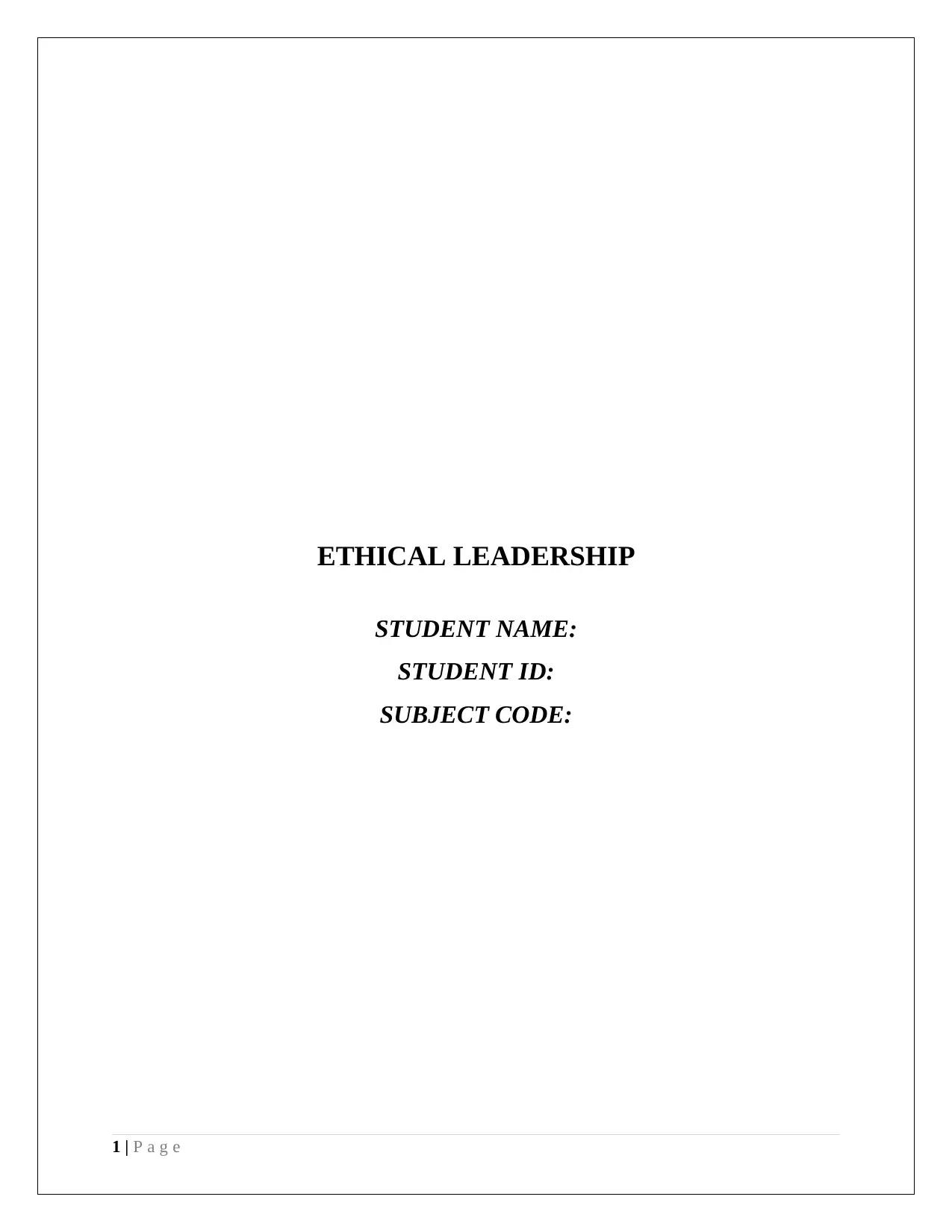
ETHICAL LEADERSHIP
STUDENT NAME:
STUDENT ID:
SUBJECT CODE:
1 | P a g e
STUDENT NAME:
STUDENT ID:
SUBJECT CODE:
1 | P a g e
Paraphrase This Document
Need a fresh take? Get an instant paraphrase of this document with our AI Paraphraser
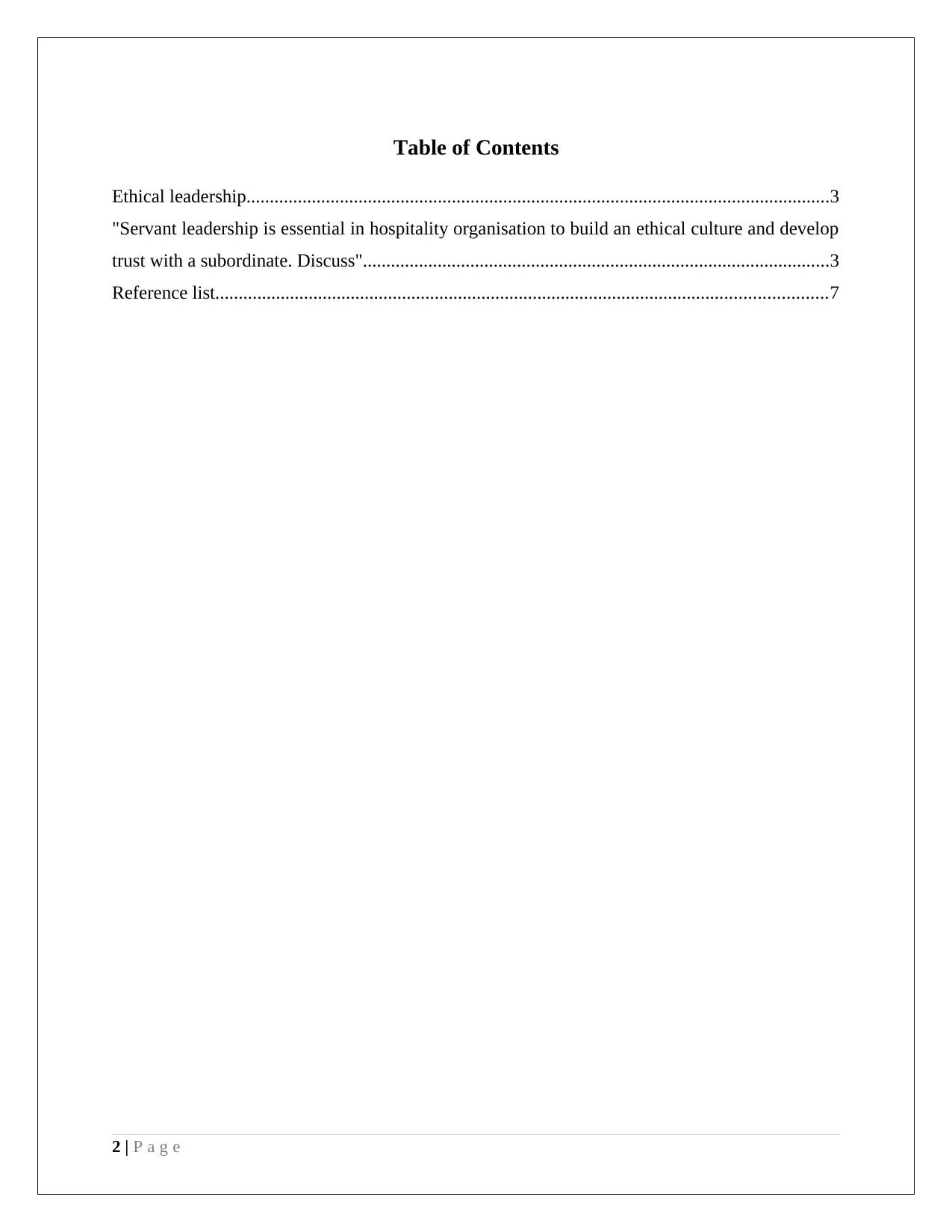
Table of Contents
Ethical leadership.............................................................................................................................3
"Servant leadership is essential in hospitality organisation to build an ethical culture and develop
trust with a subordinate. Discuss"....................................................................................................3
Reference list...................................................................................................................................7
2 | P a g e
Ethical leadership.............................................................................................................................3
"Servant leadership is essential in hospitality organisation to build an ethical culture and develop
trust with a subordinate. Discuss"....................................................................................................3
Reference list...................................................................................................................................7
2 | P a g e
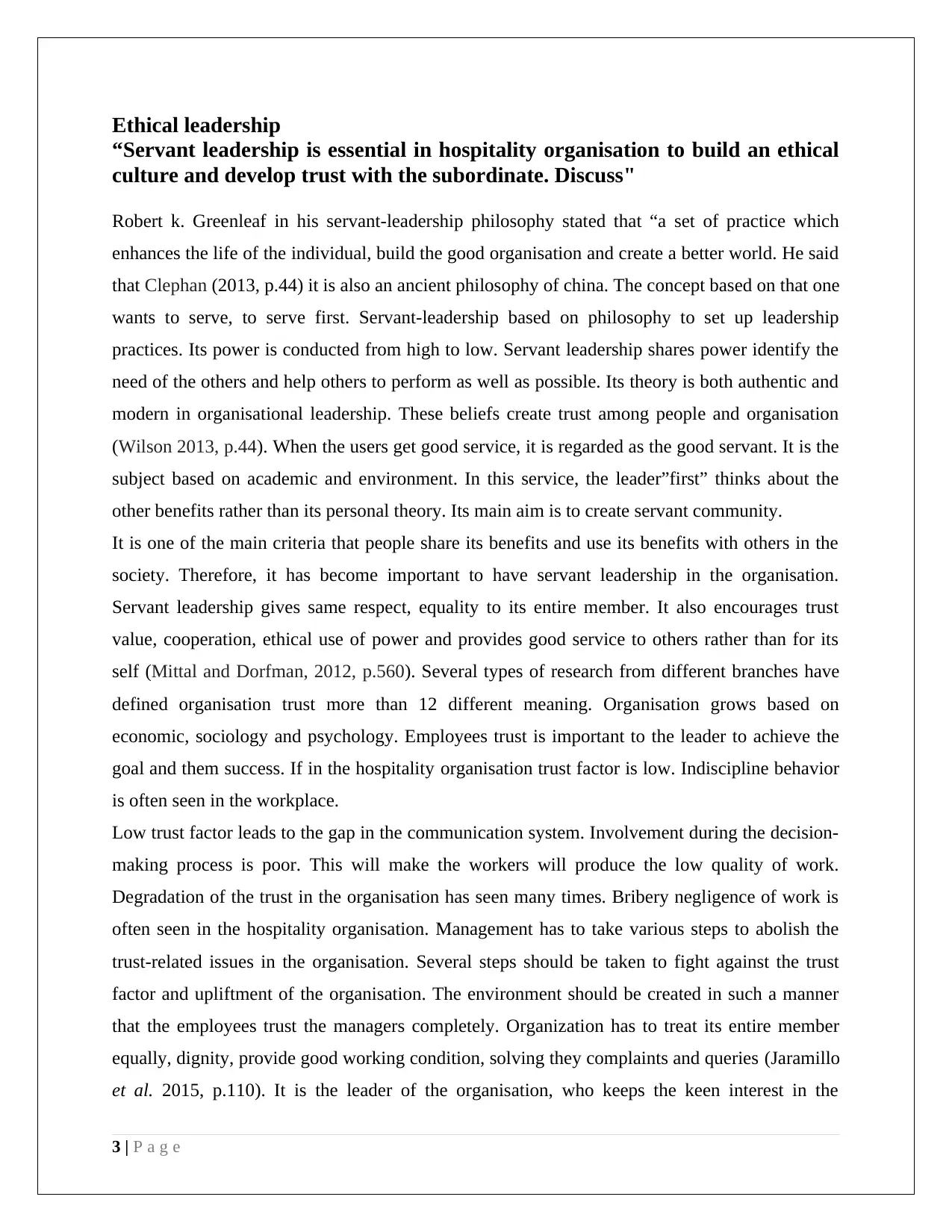
Ethical leadership
“Servant leadership is essential in hospitality organisation to build an ethical
culture and develop trust with the subordinate. Discuss"
Robert k. Greenleaf in his servant-leadership philosophy stated that “a set of practice which
enhances the life of the individual, build the good organisation and create a better world. He said
that Clephan (2013, p.44) it is also an ancient philosophy of china. The concept based on that one
wants to serve, to serve first. Servant-leadership based on philosophy to set up leadership
practices. Its power is conducted from high to low. Servant leadership shares power identify the
need of the others and help others to perform as well as possible. Its theory is both authentic and
modern in organisational leadership. These beliefs create trust among people and organisation
(Wilson 2013, p.44). When the users get good service, it is regarded as the good servant. It is the
subject based on academic and environment. In this service, the leader”first” thinks about the
other benefits rather than its personal theory. Its main aim is to create servant community.
It is one of the main criteria that people share its benefits and use its benefits with others in the
society. Therefore, it has become important to have servant leadership in the organisation.
Servant leadership gives same respect, equality to its entire member. It also encourages trust
value, cooperation, ethical use of power and provides good service to others rather than for its
self (Mittal and Dorfman, 2012, p.560). Several types of research from different branches have
defined organisation trust more than 12 different meaning. Organisation grows based on
economic, sociology and psychology. Employees trust is important to the leader to achieve the
goal and them success. If in the hospitality organisation trust factor is low. Indiscipline behavior
is often seen in the workplace.
Low trust factor leads to the gap in the communication system. Involvement during the decision-
making process is poor. This will make the workers will produce the low quality of work.
Degradation of the trust in the organisation has seen many times. Bribery negligence of work is
often seen in the hospitality organisation. Management has to take various steps to abolish the
trust-related issues in the organisation. Several steps should be taken to fight against the trust
factor and upliftment of the organisation. The environment should be created in such a manner
that the employees trust the managers completely. Organization has to treat its entire member
equally, dignity, provide good working condition, solving they complaints and queries (Jaramillo
et al. 2015, p.110). It is the leader of the organisation, who keeps the keen interest in the
3 | P a g e
“Servant leadership is essential in hospitality organisation to build an ethical
culture and develop trust with the subordinate. Discuss"
Robert k. Greenleaf in his servant-leadership philosophy stated that “a set of practice which
enhances the life of the individual, build the good organisation and create a better world. He said
that Clephan (2013, p.44) it is also an ancient philosophy of china. The concept based on that one
wants to serve, to serve first. Servant-leadership based on philosophy to set up leadership
practices. Its power is conducted from high to low. Servant leadership shares power identify the
need of the others and help others to perform as well as possible. Its theory is both authentic and
modern in organisational leadership. These beliefs create trust among people and organisation
(Wilson 2013, p.44). When the users get good service, it is regarded as the good servant. It is the
subject based on academic and environment. In this service, the leader”first” thinks about the
other benefits rather than its personal theory. Its main aim is to create servant community.
It is one of the main criteria that people share its benefits and use its benefits with others in the
society. Therefore, it has become important to have servant leadership in the organisation.
Servant leadership gives same respect, equality to its entire member. It also encourages trust
value, cooperation, ethical use of power and provides good service to others rather than for its
self (Mittal and Dorfman, 2012, p.560). Several types of research from different branches have
defined organisation trust more than 12 different meaning. Organisation grows based on
economic, sociology and psychology. Employees trust is important to the leader to achieve the
goal and them success. If in the hospitality organisation trust factor is low. Indiscipline behavior
is often seen in the workplace.
Low trust factor leads to the gap in the communication system. Involvement during the decision-
making process is poor. This will make the workers will produce the low quality of work.
Degradation of the trust in the organisation has seen many times. Bribery negligence of work is
often seen in the hospitality organisation. Management has to take various steps to abolish the
trust-related issues in the organisation. Several steps should be taken to fight against the trust
factor and upliftment of the organisation. The environment should be created in such a manner
that the employees trust the managers completely. Organization has to treat its entire member
equally, dignity, provide good working condition, solving they complaints and queries (Jaramillo
et al. 2015, p.110). It is the leader of the organisation, who keeps the keen interest in the
3 | P a g e
⊘ This is a preview!⊘
Do you want full access?
Subscribe today to unlock all pages.

Trusted by 1+ million students worldwide
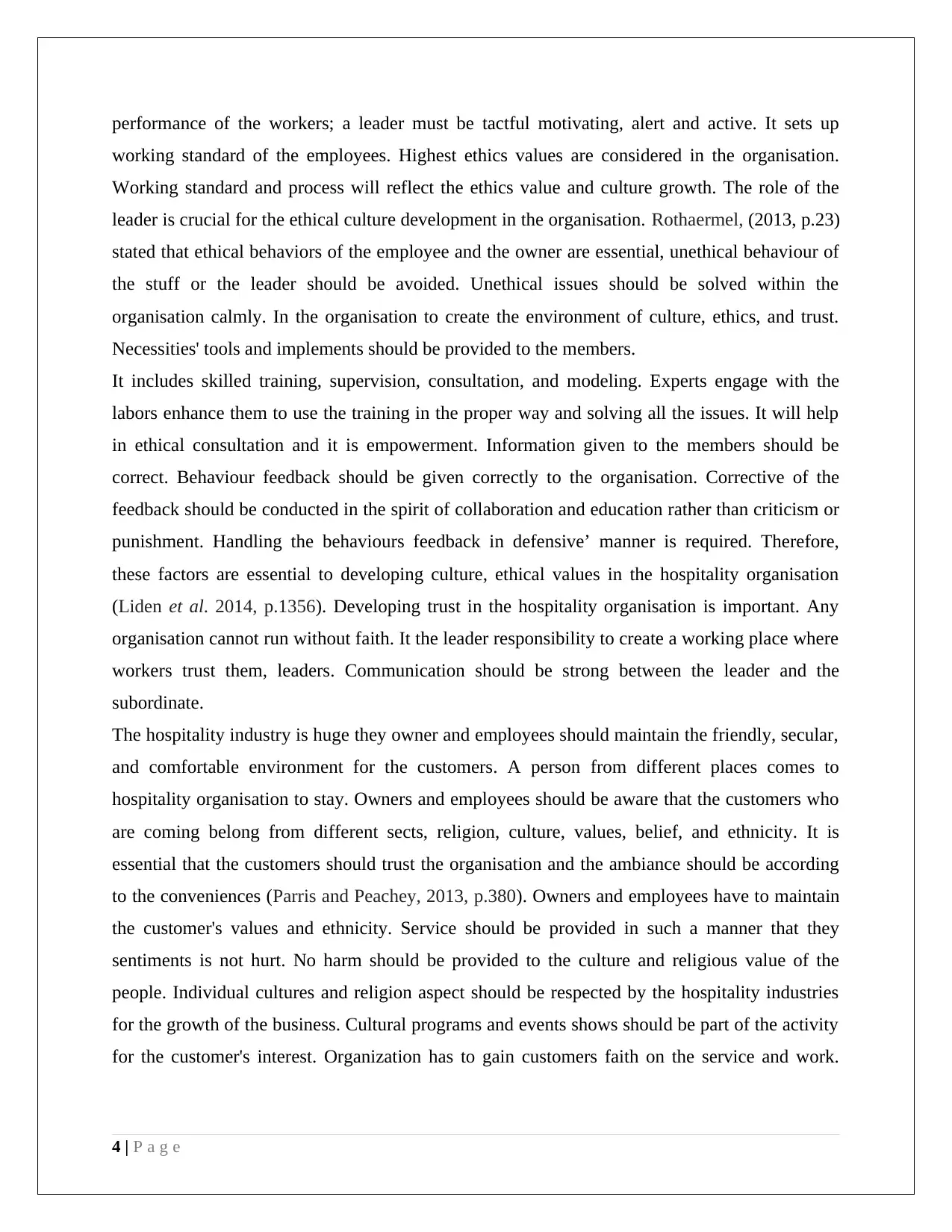
performance of the workers; a leader must be tactful motivating, alert and active. It sets up
working standard of the employees. Highest ethics values are considered in the organisation.
Working standard and process will reflect the ethics value and culture growth. The role of the
leader is crucial for the ethical culture development in the organisation. Rothaermel, (2013, p.23)
stated that ethical behaviors of the employee and the owner are essential, unethical behaviour of
the stuff or the leader should be avoided. Unethical issues should be solved within the
organisation calmly. In the organisation to create the environment of culture, ethics, and trust.
Necessities' tools and implements should be provided to the members.
It includes skilled training, supervision, consultation, and modeling. Experts engage with the
labors enhance them to use the training in the proper way and solving all the issues. It will help
in ethical consultation and it is empowerment. Information given to the members should be
correct. Behaviour feedback should be given correctly to the organisation. Corrective of the
feedback should be conducted in the spirit of collaboration and education rather than criticism or
punishment. Handling the behaviours feedback in defensive’ manner is required. Therefore,
these factors are essential to developing culture, ethical values in the hospitality organisation
(Liden et al. 2014, p.1356). Developing trust in the hospitality organisation is important. Any
organisation cannot run without faith. It the leader responsibility to create a working place where
workers trust them, leaders. Communication should be strong between the leader and the
subordinate.
The hospitality industry is huge they owner and employees should maintain the friendly, secular,
and comfortable environment for the customers. A person from different places comes to
hospitality organisation to stay. Owners and employees should be aware that the customers who
are coming belong from different sects, religion, culture, values, belief, and ethnicity. It is
essential that the customers should trust the organisation and the ambiance should be according
to the conveniences (Parris and Peachey, 2013, p.380). Owners and employees have to maintain
the customer's values and ethnicity. Service should be provided in such a manner that they
sentiments is not hurt. No harm should be provided to the culture and religious value of the
people. Individual cultures and religion aspect should be respected by the hospitality industries
for the growth of the business. Cultural programs and events shows should be part of the activity
for the customer's interest. Organization has to gain customers faith on the service and work.
4 | P a g e
working standard of the employees. Highest ethics values are considered in the organisation.
Working standard and process will reflect the ethics value and culture growth. The role of the
leader is crucial for the ethical culture development in the organisation. Rothaermel, (2013, p.23)
stated that ethical behaviors of the employee and the owner are essential, unethical behaviour of
the stuff or the leader should be avoided. Unethical issues should be solved within the
organisation calmly. In the organisation to create the environment of culture, ethics, and trust.
Necessities' tools and implements should be provided to the members.
It includes skilled training, supervision, consultation, and modeling. Experts engage with the
labors enhance them to use the training in the proper way and solving all the issues. It will help
in ethical consultation and it is empowerment. Information given to the members should be
correct. Behaviour feedback should be given correctly to the organisation. Corrective of the
feedback should be conducted in the spirit of collaboration and education rather than criticism or
punishment. Handling the behaviours feedback in defensive’ manner is required. Therefore,
these factors are essential to developing culture, ethical values in the hospitality organisation
(Liden et al. 2014, p.1356). Developing trust in the hospitality organisation is important. Any
organisation cannot run without faith. It the leader responsibility to create a working place where
workers trust them, leaders. Communication should be strong between the leader and the
subordinate.
The hospitality industry is huge they owner and employees should maintain the friendly, secular,
and comfortable environment for the customers. A person from different places comes to
hospitality organisation to stay. Owners and employees should be aware that the customers who
are coming belong from different sects, religion, culture, values, belief, and ethnicity. It is
essential that the customers should trust the organisation and the ambiance should be according
to the conveniences (Parris and Peachey, 2013, p.380). Owners and employees have to maintain
the customer's values and ethnicity. Service should be provided in such a manner that they
sentiments is not hurt. No harm should be provided to the culture and religious value of the
people. Individual cultures and religion aspect should be respected by the hospitality industries
for the growth of the business. Cultural programs and events shows should be part of the activity
for the customer's interest. Organization has to gain customers faith on the service and work.
4 | P a g e
Paraphrase This Document
Need a fresh take? Get an instant paraphrase of this document with our AI Paraphraser
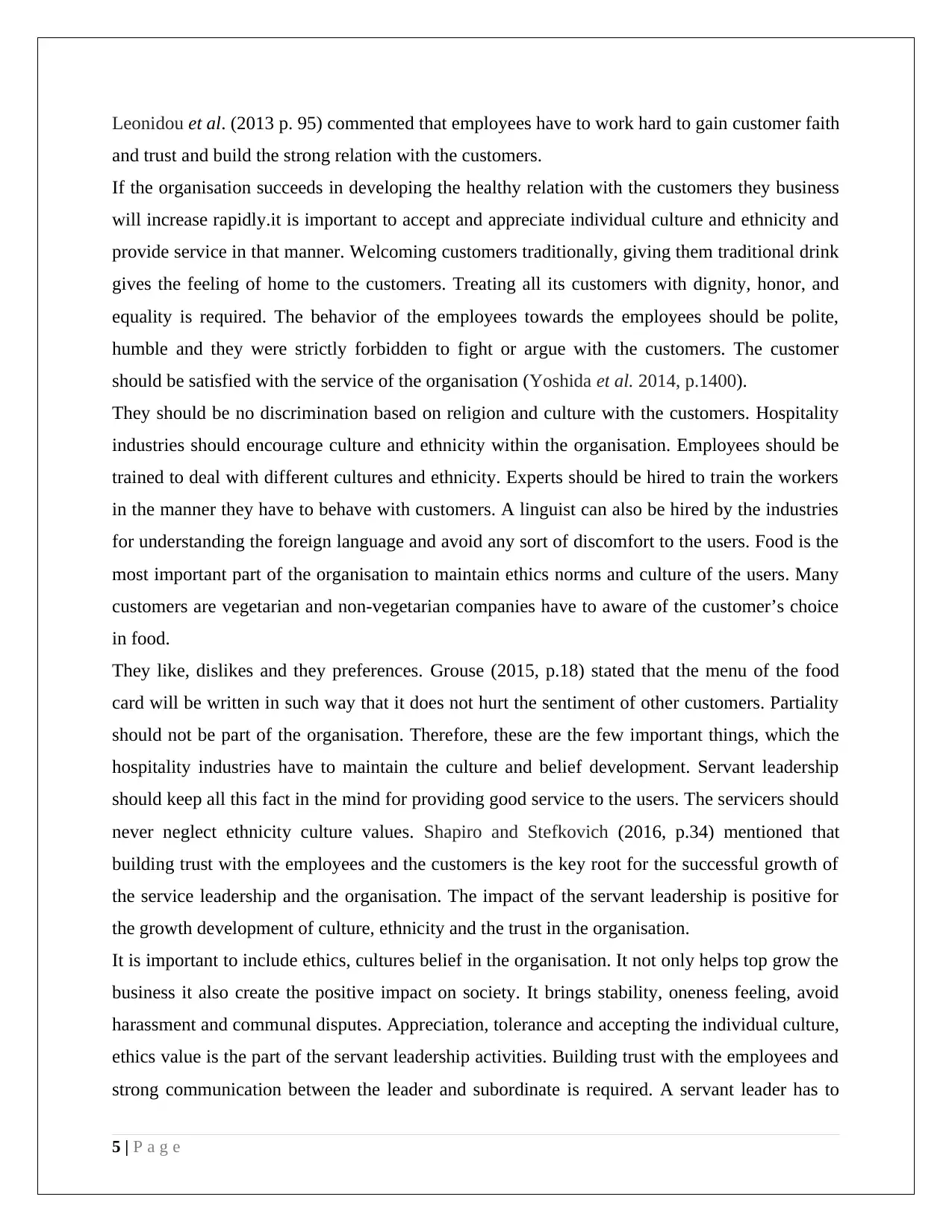
Leonidou et al. (2013 p. 95) commented that employees have to work hard to gain customer faith
and trust and build the strong relation with the customers.
If the organisation succeeds in developing the healthy relation with the customers they business
will increase rapidly.it is important to accept and appreciate individual culture and ethnicity and
provide service in that manner. Welcoming customers traditionally, giving them traditional drink
gives the feeling of home to the customers. Treating all its customers with dignity, honor, and
equality is required. The behavior of the employees towards the employees should be polite,
humble and they were strictly forbidden to fight or argue with the customers. The customer
should be satisfied with the service of the organisation (Yoshida et al. 2014, p.1400).
They should be no discrimination based on religion and culture with the customers. Hospitality
industries should encourage culture and ethnicity within the organisation. Employees should be
trained to deal with different cultures and ethnicity. Experts should be hired to train the workers
in the manner they have to behave with customers. A linguist can also be hired by the industries
for understanding the foreign language and avoid any sort of discomfort to the users. Food is the
most important part of the organisation to maintain ethics norms and culture of the users. Many
customers are vegetarian and non-vegetarian companies have to aware of the customer’s choice
in food.
They like, dislikes and they preferences. Grouse (2015, p.18) stated that the menu of the food
card will be written in such way that it does not hurt the sentiment of other customers. Partiality
should not be part of the organisation. Therefore, these are the few important things, which the
hospitality industries have to maintain the culture and belief development. Servant leadership
should keep all this fact in the mind for providing good service to the users. The servicers should
never neglect ethnicity culture values. Shapiro and Stefkovich (2016, p.34) mentioned that
building trust with the employees and the customers is the key root for the successful growth of
the service leadership and the organisation. The impact of the servant leadership is positive for
the growth development of culture, ethnicity and the trust in the organisation.
It is important to include ethics, cultures belief in the organisation. It not only helps top grow the
business it also create the positive impact on society. It brings stability, oneness feeling, avoid
harassment and communal disputes. Appreciation, tolerance and accepting the individual culture,
ethics value is the part of the servant leadership activities. Building trust with the employees and
strong communication between the leader and subordinate is required. A servant leader has to
5 | P a g e
and trust and build the strong relation with the customers.
If the organisation succeeds in developing the healthy relation with the customers they business
will increase rapidly.it is important to accept and appreciate individual culture and ethnicity and
provide service in that manner. Welcoming customers traditionally, giving them traditional drink
gives the feeling of home to the customers. Treating all its customers with dignity, honor, and
equality is required. The behavior of the employees towards the employees should be polite,
humble and they were strictly forbidden to fight or argue with the customers. The customer
should be satisfied with the service of the organisation (Yoshida et al. 2014, p.1400).
They should be no discrimination based on religion and culture with the customers. Hospitality
industries should encourage culture and ethnicity within the organisation. Employees should be
trained to deal with different cultures and ethnicity. Experts should be hired to train the workers
in the manner they have to behave with customers. A linguist can also be hired by the industries
for understanding the foreign language and avoid any sort of discomfort to the users. Food is the
most important part of the organisation to maintain ethics norms and culture of the users. Many
customers are vegetarian and non-vegetarian companies have to aware of the customer’s choice
in food.
They like, dislikes and they preferences. Grouse (2015, p.18) stated that the menu of the food
card will be written in such way that it does not hurt the sentiment of other customers. Partiality
should not be part of the organisation. Therefore, these are the few important things, which the
hospitality industries have to maintain the culture and belief development. Servant leadership
should keep all this fact in the mind for providing good service to the users. The servicers should
never neglect ethnicity culture values. Shapiro and Stefkovich (2016, p.34) mentioned that
building trust with the employees and the customers is the key root for the successful growth of
the service leadership and the organisation. The impact of the servant leadership is positive for
the growth development of culture, ethnicity and the trust in the organisation.
It is important to include ethics, cultures belief in the organisation. It not only helps top grow the
business it also create the positive impact on society. It brings stability, oneness feeling, avoid
harassment and communal disputes. Appreciation, tolerance and accepting the individual culture,
ethics value is the part of the servant leadership activities. Building trust with the employees and
strong communication between the leader and subordinate is required. A servant leader has to
5 | P a g e
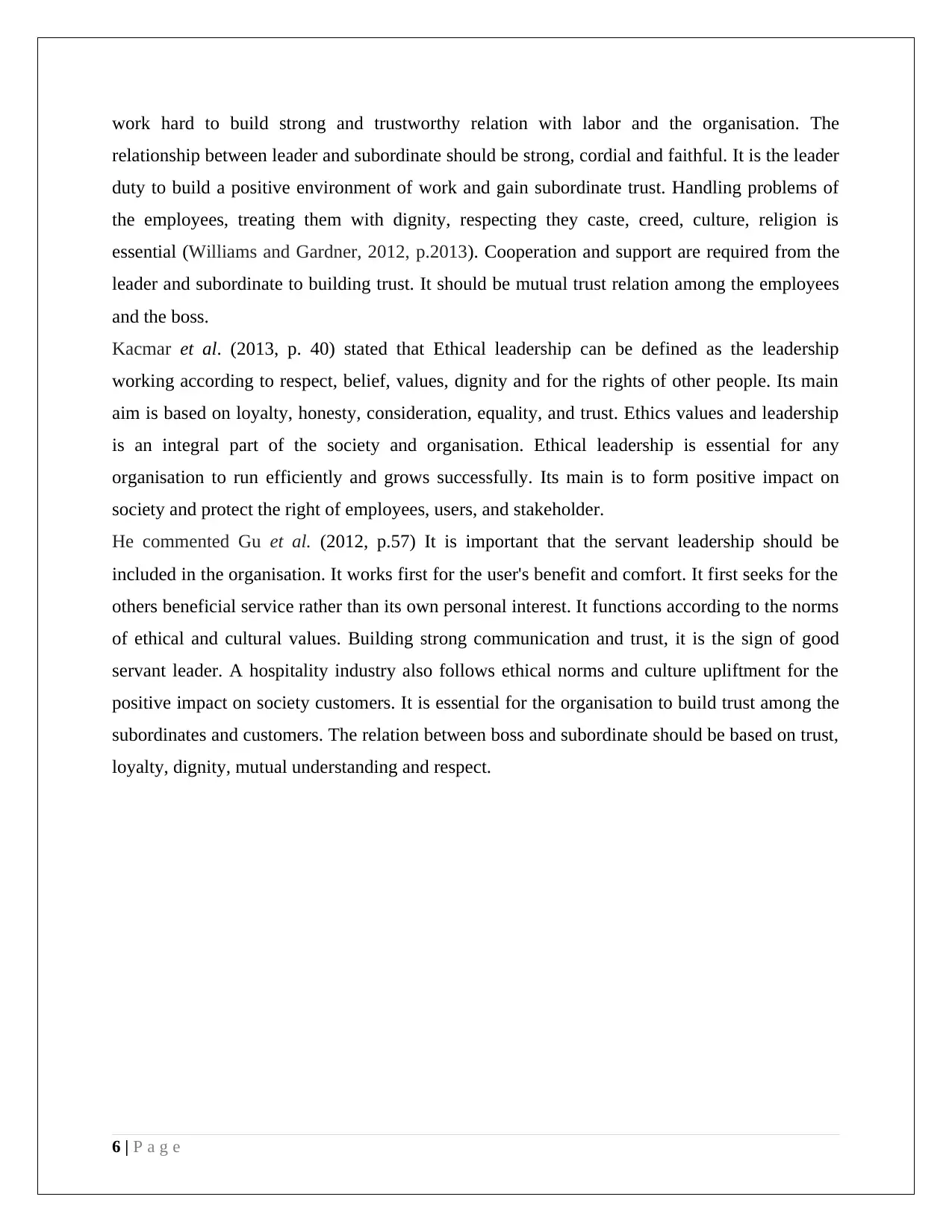
work hard to build strong and trustworthy relation with labor and the organisation. The
relationship between leader and subordinate should be strong, cordial and faithful. It is the leader
duty to build a positive environment of work and gain subordinate trust. Handling problems of
the employees, treating them with dignity, respecting they caste, creed, culture, religion is
essential (Williams and Gardner, 2012, p.2013). Cooperation and support are required from the
leader and subordinate to building trust. It should be mutual trust relation among the employees
and the boss.
Kacmar et al. (2013, p. 40) stated that Ethical leadership can be defined as the leadership
working according to respect, belief, values, dignity and for the rights of other people. Its main
aim is based on loyalty, honesty, consideration, equality, and trust. Ethics values and leadership
is an integral part of the society and organisation. Ethical leadership is essential for any
organisation to run efficiently and grows successfully. Its main is to form positive impact on
society and protect the right of employees, users, and stakeholder.
He commented Gu et al. (2012, p.57) It is important that the servant leadership should be
included in the organisation. It works first for the user's benefit and comfort. It first seeks for the
others beneficial service rather than its own personal interest. It functions according to the norms
of ethical and cultural values. Building strong communication and trust, it is the sign of good
servant leader. A hospitality industry also follows ethical norms and culture upliftment for the
positive impact on society customers. It is essential for the organisation to build trust among the
subordinates and customers. The relation between boss and subordinate should be based on trust,
loyalty, dignity, mutual understanding and respect.
6 | P a g e
relationship between leader and subordinate should be strong, cordial and faithful. It is the leader
duty to build a positive environment of work and gain subordinate trust. Handling problems of
the employees, treating them with dignity, respecting they caste, creed, culture, religion is
essential (Williams and Gardner, 2012, p.2013). Cooperation and support are required from the
leader and subordinate to building trust. It should be mutual trust relation among the employees
and the boss.
Kacmar et al. (2013, p. 40) stated that Ethical leadership can be defined as the leadership
working according to respect, belief, values, dignity and for the rights of other people. Its main
aim is based on loyalty, honesty, consideration, equality, and trust. Ethics values and leadership
is an integral part of the society and organisation. Ethical leadership is essential for any
organisation to run efficiently and grows successfully. Its main is to form positive impact on
society and protect the right of employees, users, and stakeholder.
He commented Gu et al. (2012, p.57) It is important that the servant leadership should be
included in the organisation. It works first for the user's benefit and comfort. It first seeks for the
others beneficial service rather than its own personal interest. It functions according to the norms
of ethical and cultural values. Building strong communication and trust, it is the sign of good
servant leader. A hospitality industry also follows ethical norms and culture upliftment for the
positive impact on society customers. It is essential for the organisation to build trust among the
subordinates and customers. The relation between boss and subordinate should be based on trust,
loyalty, dignity, mutual understanding and respect.
6 | P a g e
⊘ This is a preview!⊘
Do you want full access?
Subscribe today to unlock all pages.

Trusted by 1+ million students worldwide
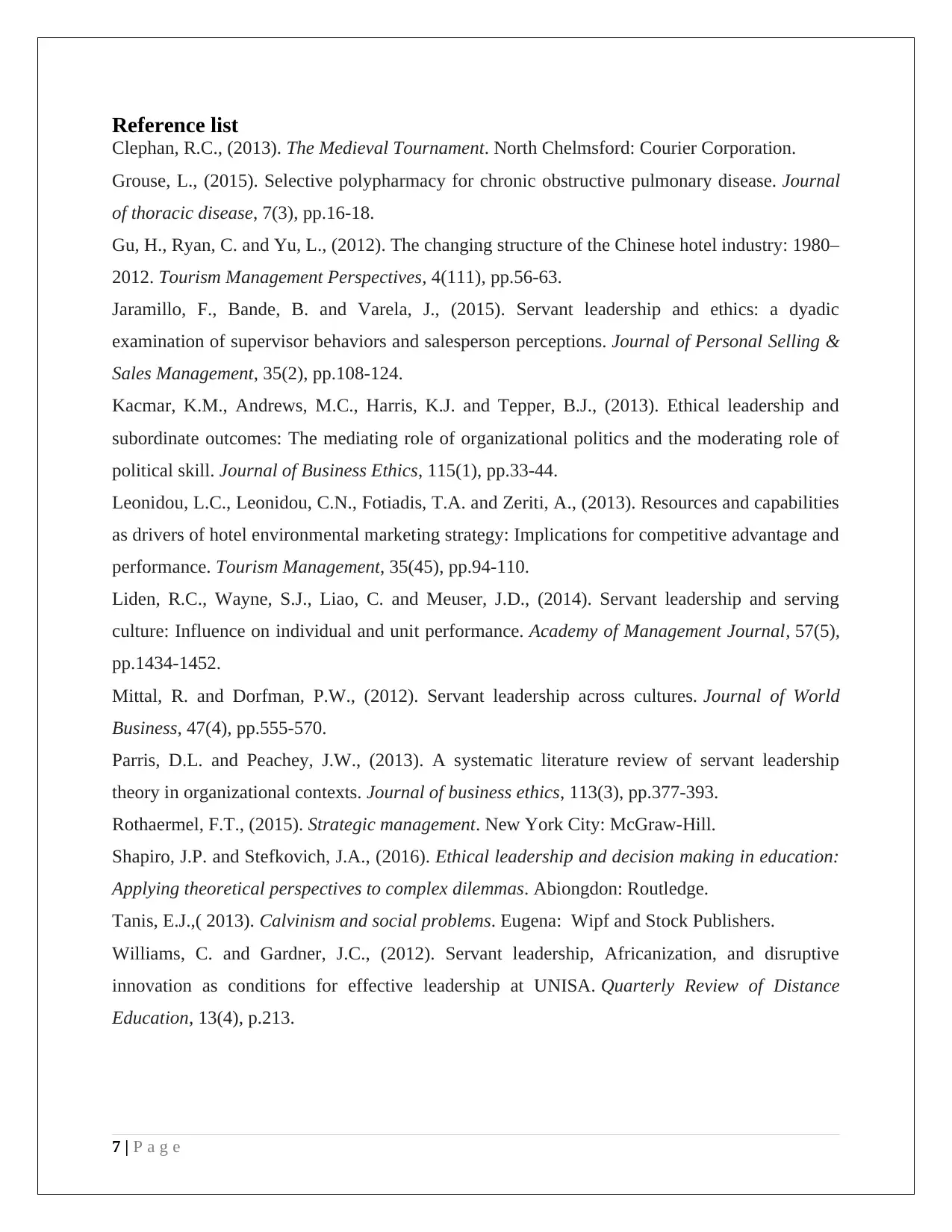
Reference list
Clephan, R.C., (2013). The Medieval Tournament. North Chelmsford: Courier Corporation.
Grouse, L., (2015). Selective polypharmacy for chronic obstructive pulmonary disease. Journal
of thoracic disease, 7(3), pp.16-18.
Gu, H., Ryan, C. and Yu, L., (2012). The changing structure of the Chinese hotel industry: 1980–
2012. Tourism Management Perspectives, 4(111), pp.56-63.
Jaramillo, F., Bande, B. and Varela, J., (2015). Servant leadership and ethics: a dyadic
examination of supervisor behaviors and salesperson perceptions. Journal of Personal Selling &
Sales Management, 35(2), pp.108-124.
Kacmar, K.M., Andrews, M.C., Harris, K.J. and Tepper, B.J., (2013). Ethical leadership and
subordinate outcomes: The mediating role of organizational politics and the moderating role of
political skill. Journal of Business Ethics, 115(1), pp.33-44.
Leonidou, L.C., Leonidou, C.N., Fotiadis, T.A. and Zeriti, A., (2013). Resources and capabilities
as drivers of hotel environmental marketing strategy: Implications for competitive advantage and
performance. Tourism Management, 35(45), pp.94-110.
Liden, R.C., Wayne, S.J., Liao, C. and Meuser, J.D., (2014). Servant leadership and serving
culture: Influence on individual and unit performance. Academy of Management Journal, 57(5),
pp.1434-1452.
Mittal, R. and Dorfman, P.W., (2012). Servant leadership across cultures. Journal of World
Business, 47(4), pp.555-570.
Parris, D.L. and Peachey, J.W., (2013). A systematic literature review of servant leadership
theory in organizational contexts. Journal of business ethics, 113(3), pp.377-393.
Rothaermel, F.T., (2015). Strategic management. New York City: McGraw-Hill.
Shapiro, J.P. and Stefkovich, J.A., (2016). Ethical leadership and decision making in education:
Applying theoretical perspectives to complex dilemmas. Abiongdon: Routledge.
Tanis, E.J.,( 2013). Calvinism and social problems. Eugena: Wipf and Stock Publishers.
Williams, C. and Gardner, J.C., (2012). Servant leadership, Africanization, and disruptive
innovation as conditions for effective leadership at UNISA. Quarterly Review of Distance
Education, 13(4), p.213.
7 | P a g e
Clephan, R.C., (2013). The Medieval Tournament. North Chelmsford: Courier Corporation.
Grouse, L., (2015). Selective polypharmacy for chronic obstructive pulmonary disease. Journal
of thoracic disease, 7(3), pp.16-18.
Gu, H., Ryan, C. and Yu, L., (2012). The changing structure of the Chinese hotel industry: 1980–
2012. Tourism Management Perspectives, 4(111), pp.56-63.
Jaramillo, F., Bande, B. and Varela, J., (2015). Servant leadership and ethics: a dyadic
examination of supervisor behaviors and salesperson perceptions. Journal of Personal Selling &
Sales Management, 35(2), pp.108-124.
Kacmar, K.M., Andrews, M.C., Harris, K.J. and Tepper, B.J., (2013). Ethical leadership and
subordinate outcomes: The mediating role of organizational politics and the moderating role of
political skill. Journal of Business Ethics, 115(1), pp.33-44.
Leonidou, L.C., Leonidou, C.N., Fotiadis, T.A. and Zeriti, A., (2013). Resources and capabilities
as drivers of hotel environmental marketing strategy: Implications for competitive advantage and
performance. Tourism Management, 35(45), pp.94-110.
Liden, R.C., Wayne, S.J., Liao, C. and Meuser, J.D., (2014). Servant leadership and serving
culture: Influence on individual and unit performance. Academy of Management Journal, 57(5),
pp.1434-1452.
Mittal, R. and Dorfman, P.W., (2012). Servant leadership across cultures. Journal of World
Business, 47(4), pp.555-570.
Parris, D.L. and Peachey, J.W., (2013). A systematic literature review of servant leadership
theory in organizational contexts. Journal of business ethics, 113(3), pp.377-393.
Rothaermel, F.T., (2015). Strategic management. New York City: McGraw-Hill.
Shapiro, J.P. and Stefkovich, J.A., (2016). Ethical leadership and decision making in education:
Applying theoretical perspectives to complex dilemmas. Abiongdon: Routledge.
Tanis, E.J.,( 2013). Calvinism and social problems. Eugena: Wipf and Stock Publishers.
Williams, C. and Gardner, J.C., (2012). Servant leadership, Africanization, and disruptive
innovation as conditions for effective leadership at UNISA. Quarterly Review of Distance
Education, 13(4), p.213.
7 | P a g e
Paraphrase This Document
Need a fresh take? Get an instant paraphrase of this document with our AI Paraphraser
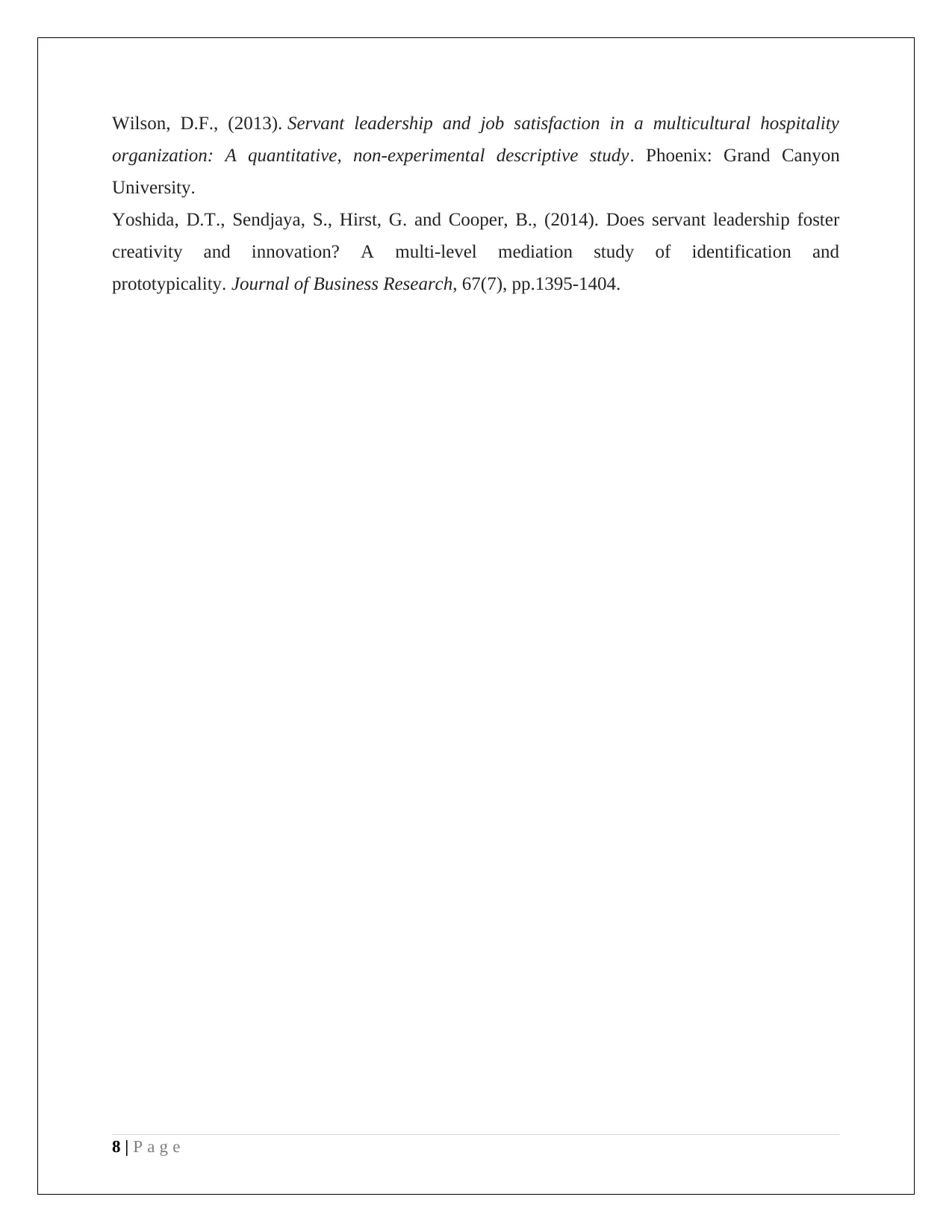
Wilson, D.F., (2013). Servant leadership and job satisfaction in a multicultural hospitality
organization: A quantitative, non-experimental descriptive study. Phoenix: Grand Canyon
University.
Yoshida, D.T., Sendjaya, S., Hirst, G. and Cooper, B., (2014). Does servant leadership foster
creativity and innovation? A multi-level mediation study of identification and
prototypicality. Journal of Business Research, 67(7), pp.1395-1404.
8 | P a g e
organization: A quantitative, non-experimental descriptive study. Phoenix: Grand Canyon
University.
Yoshida, D.T., Sendjaya, S., Hirst, G. and Cooper, B., (2014). Does servant leadership foster
creativity and innovation? A multi-level mediation study of identification and
prototypicality. Journal of Business Research, 67(7), pp.1395-1404.
8 | P a g e
1 out of 8
Related Documents
Your All-in-One AI-Powered Toolkit for Academic Success.
+13062052269
info@desklib.com
Available 24*7 on WhatsApp / Email
![[object Object]](/_next/static/media/star-bottom.7253800d.svg)
Unlock your academic potential
Copyright © 2020–2026 A2Z Services. All Rights Reserved. Developed and managed by ZUCOL.




